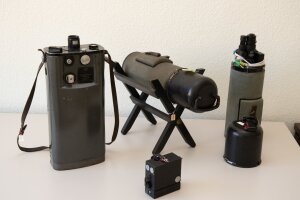Innovation through Knowledge Circulation
Photography of optical devices
Image: Christian ForstnerThe project Innovation through Knowledge Circulation. Research Technologies as Dynamic Knowledge Carriers in Circulation Processes in and between Innovation Cultures, which was funded by the DFG's Heisenberg Programme (2019-2022), brought together several threads of Christian Forstner's previous research. In his last book on nuclear energy, he was able to show that a transversal connection between science, industry and government is crucial for a successful innovation process. He used the example of optical instrument manufacturing to analyse how these transversal connections were established. The central idea was to focus on specific types of scientific instruments, so-called research technologies, which circulated as dynamic carriers of knowledge between the different parts of society. This demonstrated that this circulation process is crucial for successful innovation.
In this project, his aim was to analyse research technologies not only as generic and interstitial instruments, but as innovations. In an innovation process, research technologies circulate as dynamic knowledge carriers between different social sectors that are directly involved in the process. The knowledge associated with these technologies is by no means static, but rather dynamic and changes in the course of the circulation process. New approaches in the history of innovation have also highlighted the importance of the user in the innovation process. Therefore, the analysis of lead-user networks forms a central part of the project.
The theoretical perspective on (trans-)national knowledge circulation emphasises the role of research technologies as transversal linking elements between different social spheres such as science, state, industry or the military. In this project, Forstner analysed circulation processes within and between different innovation cultures (Germany, Japan and Brazil) with the central aim of not only gaining a better understanding of the past, but also of learning for the future.
